
The Definitive Guide to Instacart Advertising
Michelle Meleskie, Ellie Edwards, February 2, 2021
In the last year, few categories have benefited more than online grocery - with the clear leader being Instacart. And when Instacart launched their self serve advertising platform, it enabled brands to take advantage of this influx in consumer demand.
In this definitive guide, we'll walk you through how to setup, manage and optimize your Instacart ads.
A brief guide to this guide:
Instacart Ad Inventory and Ad Types
Campaign Structure
Bidding Options
Keyword Strategy
Geography, Regions and Stores
Measurement and Reporting
Part 1: Instacart Ad Inventory and Ad Types
Instacart advertising offers both self-serve and Instacart-managed ad units with their most popular offering being the self-serve Sponsored Product ad. If you advertise on Amazon or Walmart, you'll likely already be familiar with the structure of Instacart ads.
Self-Serve Sponsored Products: Search and Non-Search Placements
Although Instacart offers a few advertising options, the only current self-serve option is their Sponsored Product ads. Sponsored Products display with a "Sponsored" banner on them, similar to a Sponsored Product ad on Amazon.
Sponsored Product ads are a great way for advertisers to promote their products and have them appear in high visibility areas across Instacart. There are 2 main classifications for where these ads can appear, search and non-search.
Advertisers using Perpetua can leverage our AI-powered ad engine to build, manage and optimize their Instacart Sponsored Product ads. Check out how you can drive incremental growth for your brand here.
Search
Sponsored ads appear within search results, both before the organic results for that search term, and also within results as the shopper scrolls down the page.
Not a lot of customers tend to scroll once they are on the search page, with an approximate 80% of purchases made from products that appear in the first 1-3 rows on the search results page. These search ads help ensure brand visibility and capture new to brand customers for the specific search terms you bid on.
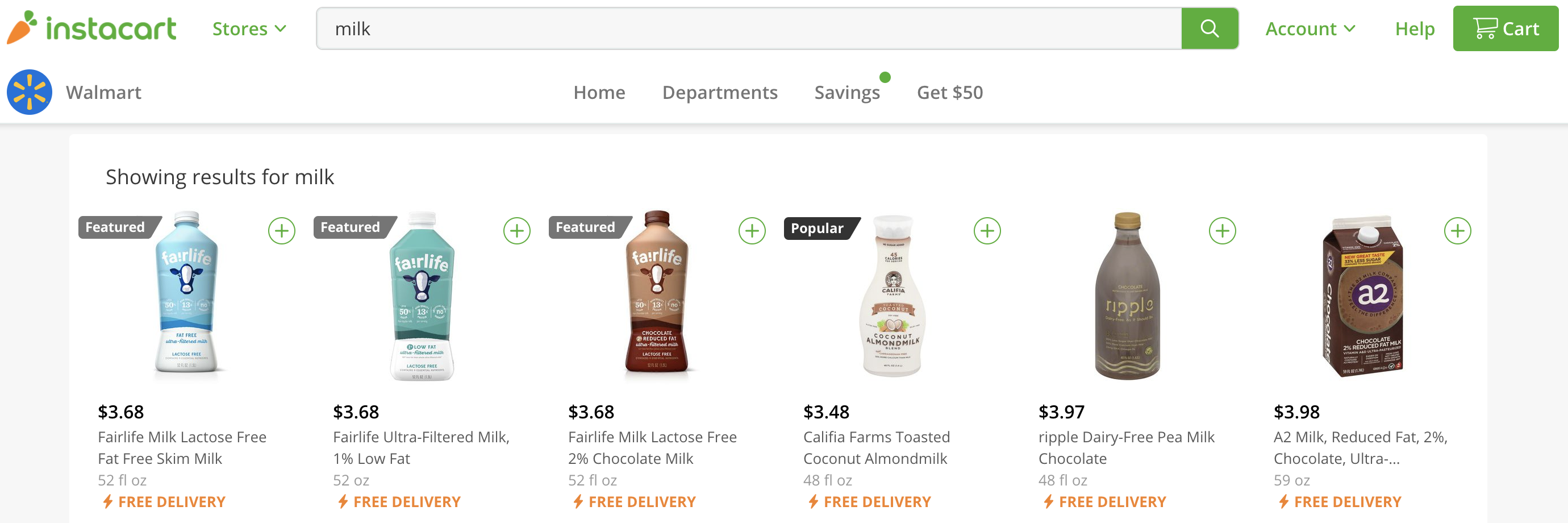
Non-Search
Non-search ads appear in several places across the platform. Anytime a customer is viewing products but has not entered a search term they can be exposed to non-search ads.
These non-search ads help ensure wider visibility for your products across the marketplace, and are not just limited to specific search terms. This broadens your chances of being viewed among a wider audience.
There are four placements where Non-Search ads will appear: department, item details, your items, home page.
Department/Aisles
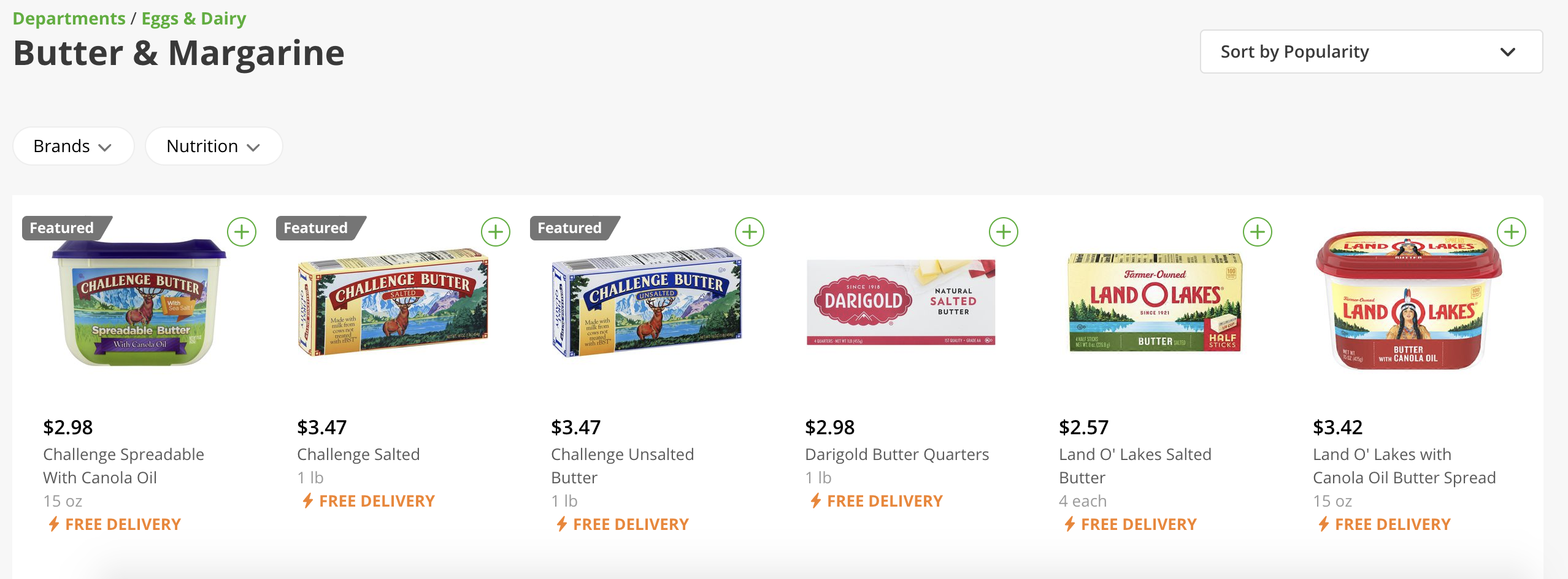
Item Details
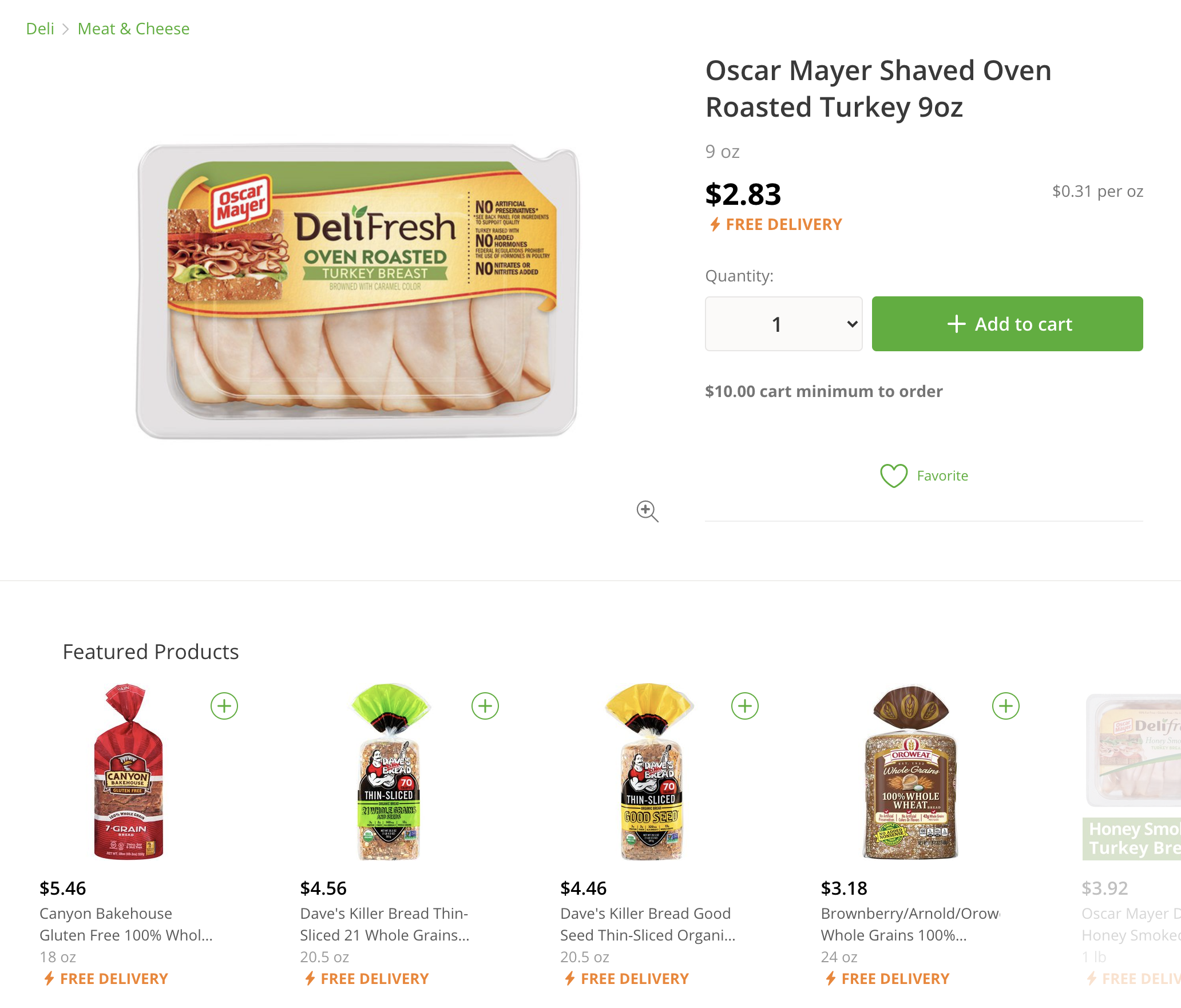
Your Items
Once a shopper has purchased an item on Instacart, that item will be placed in their "Your Items" section on Instacart. Items will show up in customer's "Your Items" section within the retailer it has been purchased at - as long as the current retailer carries that SKU.
Ads that appear in a customer's "Your Items" section help ensure you stay relevant among customers who have purchased your products in the past, driving a higher likelihood for repeat purchases and building brand loyalty.
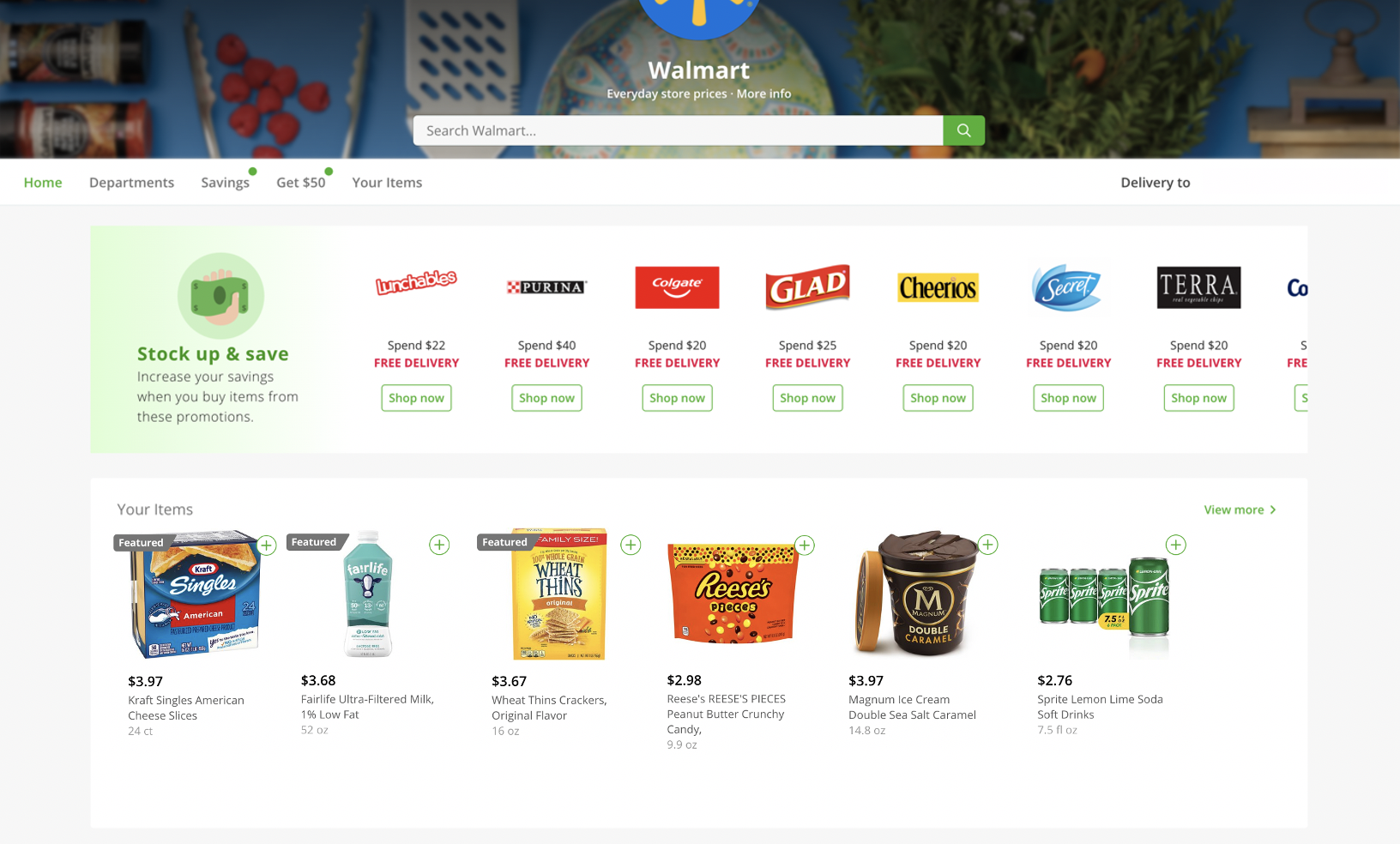
Home Page
Similar to selecting an Aisle/Department, Sponsored Ads are visible as soon as a customer clicks into a given retailer on Instacart.
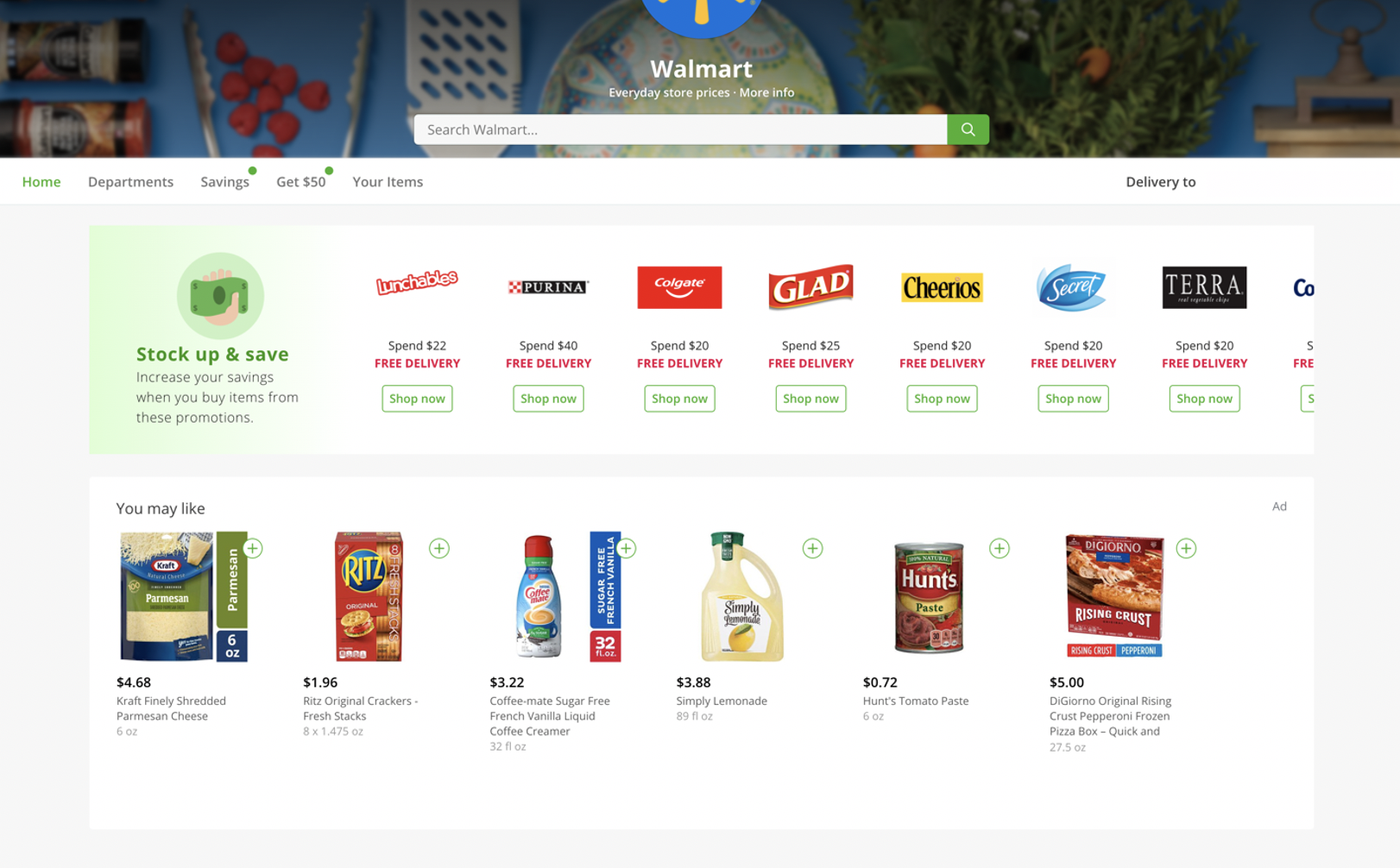
Instacart Managed Advertising
For more established advertisers, Instacart also offers access to Coupons, Hero Banner Ads and Delivery Promotion. Currently these are only available through the Instacart team directly and are not self-serve, although keep your eyes peeled as this may be changing in the future.
If you're interested, your Instacart rep will be the best contact to provide more details.
Coupons
When there are no Coupons being offered by a retailer on a particular item, there is the option to run a Coupon directly through Instacart. Coupons are best for items that tend to get significant traffic to begin with - otherwise your Coupons may not be used.
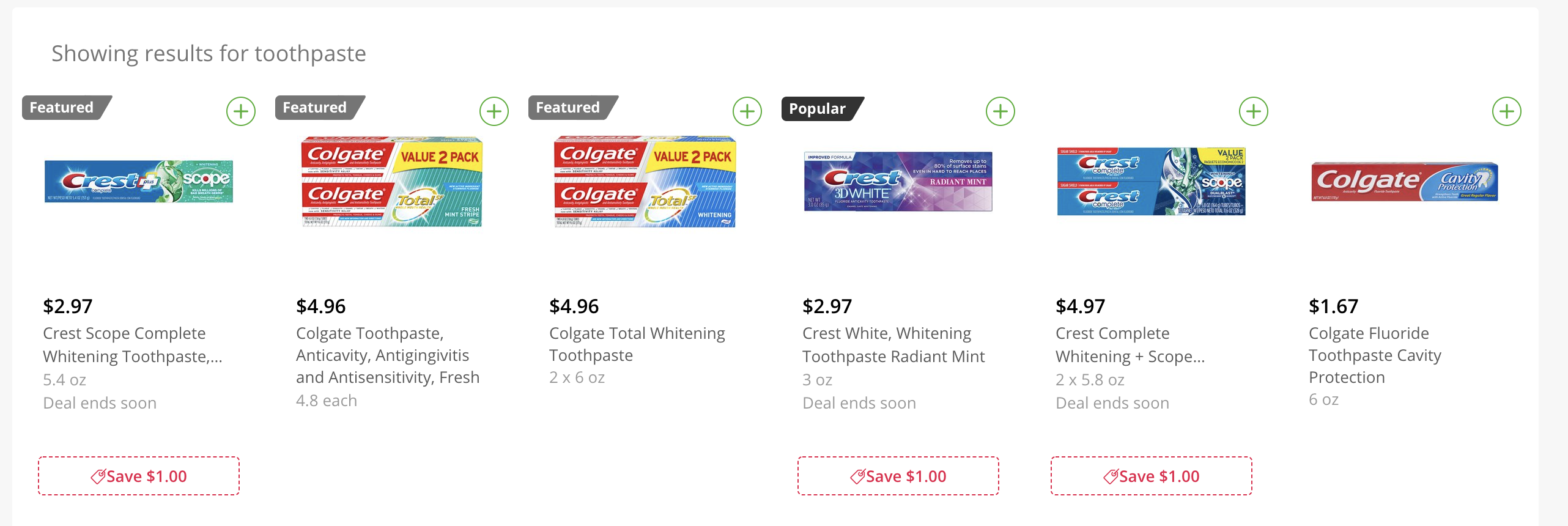
Hero Banner
A Banner Ad runs in an aisle or department at the top of the page. These advertisements run on a fixed cost per week.

Delivery Promotion
Offering free delivery after shoppers choose enough of the selected products.

Important Tip: Be Mindful of Product Images
Product images are provided to Instacart from the retailers directly. This means there is a risk of them being out of date.
If you notice that any of your images are out of date, you will need to reach out to your contact at Instacart who will provide you with a form to fill out to update your images. Updating images can take 48+ hours, so we recommend doing this as soon as possible.
Note: It is possible that what a retailer has on file can trump what images you upload, causing images to potentially differ across retailers. Instacart recommends using a Content Service Provider who can work with retailers to ensure all images are up to date. Learn more about missing or incorrect product images.
Part 2: Campaign Structure
Product Grouping
Instacart campaigns have a lifetime budget, while products and keywords are placed into ad groups within a campaign. At Perpetua, we recommend grouping your products in two ways; like products, and similarly-priced products.
Grouping Like Products:
We recommend grouping products that share over 70% of the same keywords. Doing so will ensure keyword targeting is tailored towards characteristics specific to the products within each group.
Grouping Similarly-Priced Products:
In addition to grouping products that share a significant volume of keywords, it's a good idea to group together products that fall within a similar price range. This is because the CPC (Cost-Per-Click) you're able to afford to achieve your desired return, directly relates to how products are priced.
When should I put products in the same campaign?
The benefit of using multiple campaigns vs. putting all products in the same campaign is that you can choose a distinct budget for each product group. Check our our Best Practices for Instacart Goal Setup for more on how to group products and set your targets.
Budget Profiles
Instacart offers 2 types of budgeting options:
Maximize Impressions
Your budget will be spent to maximize share of voice and impressions with no daily spend structure or limitations.
Paced Spending
This option operates similarly to Maximize Impressions, however your budget be spaced out evenly overly the schedule of your campaign. This requires an end date.
We almost always recommend using Paced Spending as opposed to Maximize Impressions, which is why this is currently the only budget structure available in Perpetua. When using Paced Spending, you are effectively setting an approximate daily budget that Instacart can use. This means that you avoid the risk of running out of your monthly budget before the month ends, which would result in having a time period where your ads do not run.
Additionally, with more retailers being added to Instacart and demand fluctuating, we have found spend on keywords to change significantly from day to day without any changes in bid prices. Unless you are checking your campaigns very closely, this can avoid any unplanned days going through a significant portion of your budget.
Part 3: Bidding Options
Instacart is a 2nd price auction system, meaning that when you win the auction, your CPC will be $0.01 higher than the next highest bid. The minimum bid that you can set on Instacart is $0.15
Instacart has 2 different types of bids:
Keyword Override Bids
Default CPC Bid
Keyword Override Bids
When launching a campaign, you can add keywords that you would like to specifically target. For each of these keywords that you add, Perpetua's ad engine will make always-on optimizations that learn over time to ensure your most efficient bid price based on your goals.
Default CPC Bid
The default CPC bid is used for bidding on all non-keyword traffic on Instacart. This includes:
Home Page
Departments
Item Details
Your items (after shopper has previously purchased that product)
The default CPC bid is also used for any new keywords automatically harvested by Instacart, which are deemed relevant to your UPCs. Perpetua's ad engine will automatically adjust bids on any new keywords that are harvested based on performance.
It If you are using Instacart's native ad console, it is important to keep all of the above in mind when you change your default CPC bid. We always recommend looking at what keywords have been set to your default bid before making any increases or decreases to ensure that you aren't decreasing the bid on high-performance keywords or increasing the bid on low-performing keywords.
Part 4: Keyword Strategy
If you are familiar with Amazon advertising, you will find that keywords on Instacart differ in 3 main ways:
It only supports EXACT match keywords
It automatically harvests new keywords
It does not support negative matching and keywords cannot be deleted
Branded Keywords
Branded keywords can be used as a part of your brand defence strategy, but are not a requirement. There is a fine balance here between growth and brand defence. While you will typically see the lowest CPC and highest ROAS on your branded keywords, to ensure ad spend is incremental, we suggest only allocating a small portion (if any) of your budget to branded keywords.
Category Keywords
Category keywords, such as "milk" or "cheese" is where we currently see the largest opportunity for growth on Instacart. Due to the lower volume of advertisers on Instacart, we find that these keywords can be won with a CPC much lower than what you would see on Amazon. Additionally if you can get customers to start to purchase your product, you gain the benefit of potential repeat customers from the "Your Items" section.
Competitor Keywords
Conquesting - bidding and winning on competitor keywords - is often used as a way to steal marketshare from competitors. However, this can be both expensive and ineffective. Your CPC for competitor keywords will almost always be higher than for category keywords, and you may see lower conversion rates as well. We recommend targeting competitors if you have a product that is frequently purchased, as the lifetime value of the customer can help to offset the high initial cost.
Optimizing Performance with Perpetua
25% of all purchases on Instacart come from the “Your Items” section, which is front and centre to the Instacart shoppers in the UI. This behaviour replicates what you'd see in the grocery aisle. As a result, we encourage our customers to consider Sponsored Products as an accelerant to driving repeat purchases and increasing market share.
Objectives like growing Category Share, increasing Basket Penetration, and improving brand and product visibility all work to help you achieve those lifetime customers.
With Perpetua's automated campaign creation and always-on optimizations saving you time, and helping maximize efficiency, you can focus on setting strategic goals and rely on Perpetua's AI-powered ad engine to execute tactically and drive optimal performance.
Grow Category Share
To grow Category Share (similar to Share of Voice with Amazon), Perpetua allows you to strategically set advanced targeting (branded, category, competitor), and distinct target ROAS and budget for your category keywords.
Unbranded terms require higher bid prices to ensure placement of your ads. With Perpetua, you can allocate significant budget specifically towards these more competitive terms. Keep in mind, target ROAS must be set proportionately lower than your branded segment to win the ad placements for category.
Increase Basket Penetration
Basket Penetration (the % of baskets on Instacart that contain your product) increases as you gain customers that are new to brand.
Perpetua offers you the ability set distinct budget and target ROAS for unbranded keyword campaigns (category and competitor), empowering you to focus on strategy rather than advertising tactics like individual bid adjustments. This is a more effective way to competitor conquest and drive new to brand purchases without cannibalizing organic branded sales.
Improve Visibility
If you're selling your products with an Instacart retail partner, it's likely that your products are already listed in Instacart. As Instacart is still a relatively new marketplace, there is a lot of opportunity for growth that is generally less expensive when compared to more mature marketplaces.
Flagship, high volume keywords are a great way to improve your visibility by getting your products in front of shoppers who don't already have a brand in mind. By decreasing target ROAS within your unbranded segments on Perpetua, you'll drive incremental traffic to your products, while also creating more opportunity to win those optimal top of search "Sponsored Products" placements.
For example, Country Archer, the #1 better-for-you jerky brand, saw a 5x higher return on ad spend, and sustained higher performance across their top four flagship, category keywords with Perpetua.
To learn more strategies on how to improve visibility, check our latest video.
Note: Perpetua's AI-powered bid adjustments and always-on optimizations use your target ROAS and daily budget to maximize the efficiency of your bids so you don't have to.
Part 5: Geography, Regions and Stores
Regions
Instacart Advertising is currently available in the United States and Canada.
Stores
When advertising on Instacart, your ads will be shown in all stores where your products are sold. This means that:
You can't choose to include or exclude specific stores
There is no risk of running ads in stores where your products aren't sold
Additionally, there is no current reporting available on which stores your advertisements are being shown in. The one exception to this, is if you have any SKUs that are only carried in specific stores (e.g. a Costco or Walmart SKU). In this case you know that all sales are coming from that specific retailer.
One benefit of this is that there is no action needed as Instacart adds new stores to their platform. When a new store is added where your product is sold, ads will immediately and automatically start serving. Keep in mind that this may cause unexpected increases in spending. This is why we recommend a paced budget, and for you to monitor any alert emails you receive.
It can take time for stores to update inventory. If you are a newly listed product, monitor Instacart to see when your product is added to the system.
Part 6: Measurement & Reporting
Attribution
Instacart shoppers typically fill their carts throughout the week and checkout at the end of the week. Due to this, there is a 14 day attribution window for Sponsored Product ads. We recommend doing analysis early in the week on the metrics from the previous week (and avoid looking at sales/spend values daily) to get the best understanding of performance.
Total Sales and Organic Sales
It is important to keep an eye on both your organic and attributed sales on any advertising platform, and Instacart is no different. You should be able to reach out to your Instacart AE to get monthly total sales figures for your brand on Instacart.
As there is an increase in the number of advertisers on Instacart at the present time, you can expect that your organic sales will decrease, regardless of whether or not you are advertising on Instacart. For this reason, we recommend looking at your Total Sales instead, to ensure that they are still increasing.
Basket Penetration
As Instacart is growing rapidly, it can be challenging to understand if growth is coming from the increase in customers vs. growing market share. Basket Penetration can show the % of baskets on Instacart that your product contains, which is a good proxy of your growth on the platform. Note that this metric is only available to brands that are spending over $10,000 per quarter.
Reporting Tiers
Instacart operates on a model where the more you spend on advertising, the more reporting you have access to. Once you are spending $10,000 per quarter, you obtain access to this tiered model.
The tier that you fall into is currently based on a spend being a certain % of your total sales on the platform. The tier that you are placed in is based on your spending from the previous quarter, and applies to the next quarter. Current reports we find particularily interesting include:
Performance Metrics by week
Regional Sales
Basket Penetration
Interested in getting started on Instacart?
Simply connect your Instacart account, and get growing. Get Started Now
Don't have an Instacart account or want to learn more? Reach out to us at hello@perpetua.io or speak with your Data Strategist, and we would be happy to help you.
To get started or learn more about how Perpetua can help you scale your Amazon Advertising business, contact us at hello@perpetua.io